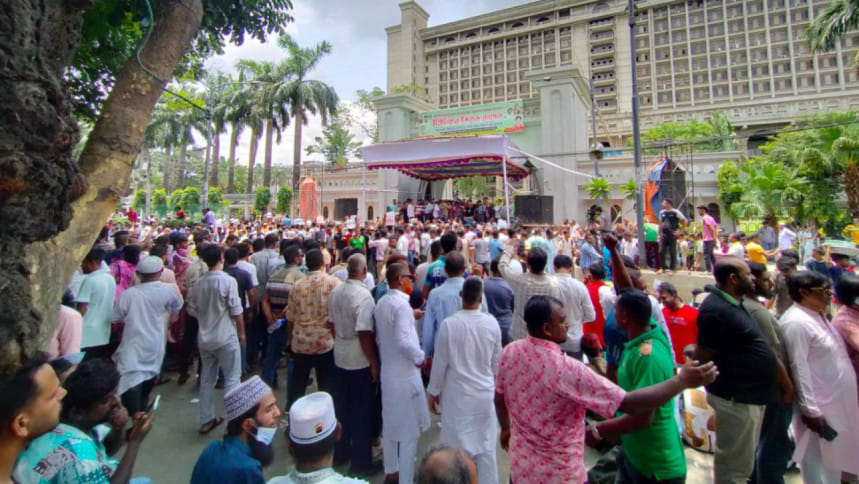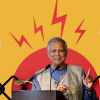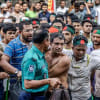The price of unchecked protest politics

Once a symbol of resilience, Dhaka has now become synonymous with relentless street protests and processions with various demands. What was once a means of voicing collective grievances has turned into a spectacle that is chaotic, disruptive, and at times alarmingly close to being anarchist. In today's Dhaka, the fastest way to be heard is not through dialogue or democratic processes, but by blocking roads and disrupting public life. The more disruption one causes, the more likely they will gain attention and concessions.
This shift reflects a deeper crisis: the breakdown of institutional governance. The streets have replaced the parliament and other platforms for voicing demands and shaping national discourse. Negotiation has given way to confrontation. Tragically, public suffering—once something to be avoided—has become a calculated strategy. Disorder is now the norm.
What we are witnessing is more than just a wave of protests, however. Since the July uprising, a troubling new trend has emerged. Under the guise of "mob justice," various groups, including students, have taken the law into their own hands. Empowered by public sympathy and a sense of impunity, they have often engaged in unlawful activities without accountability. What began as a broad-based movement for democratic renewal is now at risk of being hijacked by those seeking power, recognition, or revenge.
Is this the spirit of July? Did people sacrifice their lives for lawlessness to prevail? The movement was not led by students alone—it was a national awakening that drew strength from people across social, political, and ideological divides. Even many Awami League supporters took part, united by a desire for genuine change. Yet now, some groups are attempting to claim sole ownership of that legacy, silencing or ignoring the very diversity that made the uprising powerful.
The real danger lies in the precedent that these token street victories are setting for the future. From public to private university students, from government to private sector employees—everyone seems to be on the streets, forming new protest groups with new demands every day. The demands are endless, and so are the chaos and disruption. It was the students who paved this path, showing how the government could be influenced or forced by protests. When Awami League's activities were recently banned under pressure from demonstrators led by NCP and other groups, it further solidified the appeal for exploitative street protests.
We've seen such patterns before. The Shahbagh movement, too, began with high hopes on the streets. But without structural backing, leadership, and clear goals, it faltered. That history should be a warning: revolutions that remain on the streets are vulnerable to being co-opted, lost, or crushed.
Meanwhile, the interim government, entrusted with steering the nation towards its most critical election in decades, is faltering. Reform was promised. A fresh start was envisioned. But instead, we see delay, dysfunction, and drift. While some argue that the government is overwhelmed, others believe it is using the unrest to justify prolonging its stay in power. Either way, public trust is eroding, and expectations are fading.
What's most disappointing is that capable individuals are in key positions, yet they appear paralysed by indecision or political caution. The government has either failed to set its priorities right or has chosen to linger in power. As the days pass, the distance between the people's aspirations and the state's actions only grows.
The Yunus administration's signature stance has been to turn a blind eye till a street campaign begins to disrupt civic life and cause serious public suffering. But by that point, the one immediate and most expedient recourse has been to capitulate and agree to the demands.
The interim government has thus far failed to show a convincing resolve to reject demands from the streets, no matter how unreasonable. Whether it was to increase the age limit for government jobs or the demand for a separate university for certain colleges, the government has not been able to dissuade protesters in most cases. Nor has it been able to foil such campaigns.
The path forward must begin with restoring law and order, not through repression, but through principled leadership. Parliament, not the streets, must once again become the centre of democratic discourse, which demands an immediate, transparent, and credible election roadmap. Only then can the people's voice return to its rightful place: within the institutions built to serve them.
If this moment is squandered—if the hopes of July dissolve into infighting and opportunism—the consequences will be devastating. Bangladesh has waited too long for democratic rebirth. It cannot afford to be betrayed again.
Mohammad Al-Masum Molla is a journalist at The Daily Star. He can be reached at [email protected].
Views expressed in this article are the author's own.
Follow The Daily Star Opinion on Facebook for the latest opinions, commentaries, and analyses by experts and professionals. To contribute your article or letter to The Daily Star Opinion, see our guidelines for submission.

 For all latest news, follow The Daily Star's Google News channel.
For all latest news, follow The Daily Star's Google News channel. 










Comments